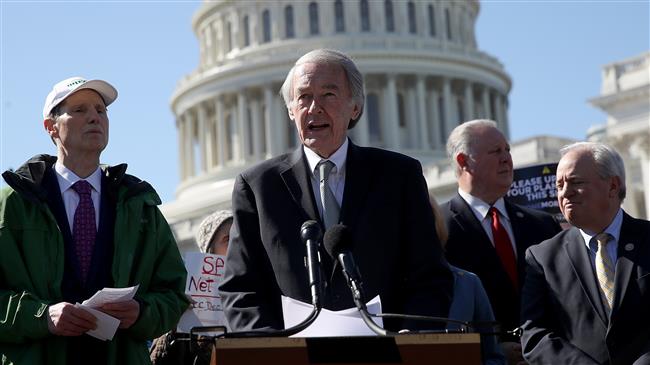Senator Ed Markey concerned as US mulls nuclear deal with Riyadh
US Senator Ed Markey has expressed concern over the Trump administration's efforts to sign a nuclear cooperation deal with Saudi Arabia for the construction of nuclear reactors.
Markey, a Democrat from Massachusetts and a member of the Senate Foreign Relations Committee, said any nuclear deal with Riyadh must require a non-proliferation accord, known as a "123 agreement," which is designed to prevent the spread of nuclear weapons.
"Previous US efforts to conclude a 123 agreement with Saudi Arabia have been unsuccessful because of its long-standing refusal to commit to foregoing any uranium enrichment or spent-fuel reprocessing on its territory -- the so-called... 'gold standard' for 123 agreements," Markey said in a letter to Secretary of State Rex Tillerson and Energy Secretary Rick Perry, AFP reported.
Perry will head to London to meet with Saudi officials on Friday.
The talks were frozen under the administration of former President Barack Obama after the Saudis refused to accept the “gold standard” for civil nuclear cooperation deals.
The Trump administration has resumed the talks and is reportedly considering a deal that would allow Riyadh to enrich and reprocess uranium and pave the way for American companies to build nuclear reactors in the kingdom.
Saudi Arabia is expected to announce early in March its list of companies which will bid to build its reactors.
Besides the American firm Westinghouse Electric Co., companies from Russia, France, China and South Korea have also shown an interest to bid.
Perry's meeting with Saudi Arabian Minister of Energy and Industry Khalid Bin Abdulaziz Al-Falih in London will be a crucial stage in the negotiations, which have reportedly been ongoing for months.
Analysts say the US may be ready to give up the “gold standard” in an attempt to prevent the profitable agreement from going to other potential contractors, including Russia and China.
Efforts to get involved in Saudi Arabia's nuclear ambitions come as President Trump has repeatedly described the 2015 nuclear deal with Iran as “the worst and most one-sided transaction Washington has ever entered into.”
Trump on January 12 reluctantly agreed to waive sanctions against Iran that were lifted as part of the deal, but said it would be the last time he issued such a waiver unless conditions were met.
Trump visited Saudi Arabia on his first foreign trip last year, signing a deal with the kingdom to provide it with $110 billion worth of weapons. Washington has been a major supporter of the Riyadh regime in its deadly war against Yemen.
VIDEO | 444 days of ethnic cleansing
VIDEO | Bethlehem's Christmas dimmed by war, restrictions
Israel admits assassinating Hamas leader, vows to inflict same fate on Yemeni fighters, people
VIDEO | Yemeni forces repel US-British attack, down F-18 Jet
Iran’s capabilities vast; enemy’s ‘maximum pressure’ policies all failed miserably: Senior official
Iran’s economy grew 2.7% y/y in Sep quarter: CBI
VIDEO | Freelancers in Gaza strive to stay online amid genocide
Mikati demands Israel's withdrawal from south Lebanon












 This makes it easy to access the Press TV website
This makes it easy to access the Press TV website